Colin Tilney (born 31 October 1933) is a harpsichordist, fortepianist and teacher.
Colin Tilney (born 31 October 1933) is a harpsichordist, fortepianist and teacher.
Born in London, Tilney studied music and modern languages at Cambridge University, studied harpsichord with Mary Potts at King's College, Cambridge, and became a student of Gustav Leonhardt. [1] After graduation at Cambridge he spent several years as an opera coach and piano accompanist at Sadler's Wells Theatre and the New Opera Company, following which he focused his energies on teaching and performing on early keyboard instruments. [1] In 1964 he was the harpsichordist under the direction of Igor Stravinsky for the second Columbia recording of The Rake's Progress . [1]
In 1979 Tilney moved to Canada and settled in Toronto, where he continued to teach privately and at the Royal Conservatory of Music. [1] He performed with Tafelmusik Baroque Orchestra and the Toronto Consort, [1] as well as touring to Asia, Australia, Europe and Great Britain. In 1985 he formed the chamber ensemble Les Coucous Bénévoles, which regularly commissions new music by Canadian composers. [1] He taught for several seasons at the Dartington Summer Festival in Totnes, England. He has been recorded for radio broadcast by the BBC and CBC, which has issued CDs of his performances. In 2002 Tilney moved to Victoria, British Columbia, where he continues to teach and perform.
Tilney is well known for his historically informed approach to performance practice, performing on original instruments or copies thereof, largely using contemporary scores. [1]
Tilney's contributions to literature include The Art of the Unmeasured Prelude: France 1660 to 1720 (Schott's, London, 1991), [2] and previously unpublished harpsichord music by Antoine Forqueray (Heugel, 1970). [3]
Tilney has a long discography of harpsichord and fortepiano performances from labels including Dorian, Deutsche Harmonia Mundi, L'Oiseau-Lyre, EMI Reflexe, Nonesuch, Vangard, DoReMi and several others. [1]
Johann Caspar Ferdinand Fischer was a German Baroque composer. Johann Nikolaus Forkel ranked Fischer as one of the best composers for keyboard of his day; however, partly due to the rarity of surviving copies of his music, his music is rarely heard today.
Ralph Leonard Kirkpatrick was an American harpsichordist and musicologist, widely known for his chronological catalog of Domenico Scarlatti's keyboard sonatas as well as for his performances and recordings.
Jacques Champion de Chambonnières was a French harpsichordist, dancer and composer. Born into a musical family, Chambonnières made an illustrious career as court harpsichordist in Paris and was considered by many of his contemporaries to be one of the greatest musicians in Europe. However, late in life Chambonnières gradually fell out of favor at the court and lost his position. He died in poverty, but at an advanced age, and not before publishing a number of his works. Today Chambonnières is considered one of the greatest representatives of the early French harpsichord school.

Gustav Maria Leonhardt was a Dutch keyboardist, conductor, musicologist, teacher and editor. He was a leading figure in the historically informed performance movement to perform music on period instruments.

Jean-Henri d'Anglebert was a French composer, harpsichordist and organist. He was one of the foremost keyboard composers of his day.
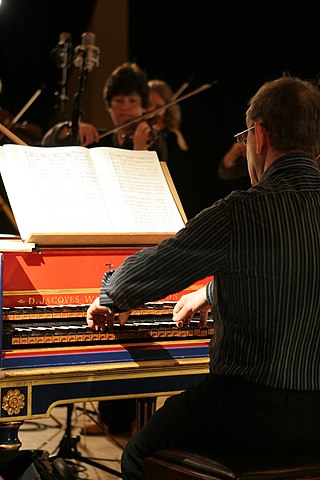
A harpsichordist is a person who plays the harpsichord. Harpsichordists may play as soloists, as accompanists, as chamber musicians, or as members of an orchestra, or some combination of these roles. Solo harpsichordists may play unaccompanied sonatas for harpsichord or concertos accompanied by orchestra. Accompanist harpsichordists might accompany singers or instrumentalists, either playing works written for a voice and harpsichord or an orchestral reduction of the orchestra parts. Chamber musician harpsichordists could play in small groups of instrumentalists, such as a quartet or quintet. Baroque-style orchestras and opera pit orchestras typically have a harpsichordist to play the chords in the basso continuo part.
Unmeasured or non-measured prelude is a prelude in which the duration of each note is left to the performer. Typically the term is used for 17th century harpsichord compositions that are written without rhythm or metre indications, although various composers of the Classical music era were composing small preludes for woodwind instruments using non-measured notation well into the 19th century. The form resurfaced in the aleatory music of the 20th century, where various other aspects of performance are also left to free interpretation.
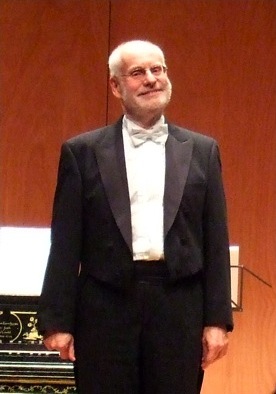
Antonius Gerhardus Michael "Ton" Koopman is a Dutch conductor, organist, harpsichordist, and musicologist, primarily known for being the founder and director of the Amsterdam Baroque Orchestra & Choir.
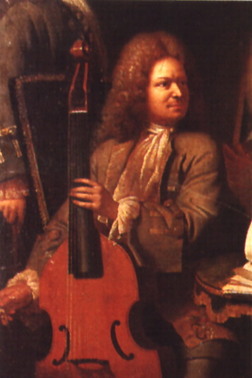
Antoine Forqueray was a French composer and virtuoso of the viola da gamba.

Élisabeth Claude Jacquet de La Guerre was a French musician, harpsichordist and composer.

Christophe Rousset is a French harpsichordist and conductor, who specializes in the performance of Baroque music on period instruments. He is also a musicologist, particularly of opera and European music of the 17th and 18th centuries and is the founder of the French music ensemble Les Talens Lyriques.

Alan Curtis was an American harpsichordist, musicologist, and conductor of baroque opera.

Jean-Baptiste Forqueray, the son of Antoine Forqueray, was a player of the viol and a composer.
Jan Křtitel Kuchař, or also German: Johann Baptist Kucharz was a Czech organist, mandolinist, harpsichordist, music composer, operatic conductor, and teacher. He was born in the Holy Roman Empire.
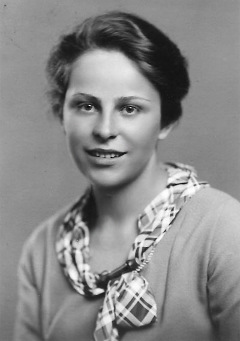
Isolde Ahlgrimm was an Austrian harpsichordist and fortepianist. In 1975 she was awarded the Austrian Gold Medal.

Peter Watchorn is an Australian-born harpsichordist who has combined a virtuosic keyboard technique, musical scholarship and practical experience in the construction of harpsichords copied from original instruments of the 17th and 18th centuries. As well as presenting many solo public performances and broadcasts of baroque keyboard music and participating in choral and orchestral performances, he has made numerous commercial CD recordings of solo harpsichord music from the 17th and 18th centuries.
Peter Hannan is a Canadian composer, opera director and recorder player based in British Columbia. Hannan has composed music for the recorder, and is known for his work in the field of electro-acoustics. and sampled music as well as his compositions for modern opera.

Martin Pearlman is an American conductor, harpsichordist, composer, and early music specialist. He founded the first permanent Baroque orchestra in North America with Boston Baroque in 1973–74. Many of its original players went on to play in or direct other ensembles in what became a growing field in the American music scene. He later founded the chorus of that ensemble and has been the music director of Boston Baroque from its inception up to the present day.

Mario Raskin is an Argentine harpsichordist. He was born in Buenos Aires and lives in Paris, France.
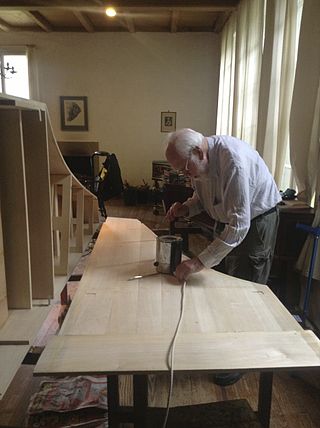
(Franz Hermann) Martin Skowroneck was a German harpsichord builder, one of the pioneers of the modern movement of harpsichord construction on historical principles.